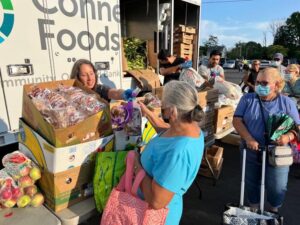- About Us
-
-
About Us
-
-
-

-
“This is an opportunity for our students to provide more for their families, for our students who may not have access to the resources that others do. It’s a blessing for the students who need that support.”
Randall Ward, Director of Student Services, Capital Community College in Hartford
-
- Find Help
- Ways to Give
- Volunteer
- Donate
- Partner Programs
On Wednesday, October 25th, the United States Department of Agriculture (USDA) released its Household Food Security in the United States in 2022 report showing that 1 in 7 people, including 1 in 5 children live in food insecure households – an increase of more than 30% and 40% respectively compared to 2021.
That is the highest rate and number since 2014 and the largest one-year increase since 2008, which many will remember as the first year of the Great Recession. While many people are shocked by these numbers, here at Connecticut Foodshare we are not. These numbers reflect what we and the network of 650+ partner programs and mobile food pantries throughout the state have been seeing first-hand over the past several months: increased need, lines more than doubling in size, and some partners seeing record high attendance.
The issue of food insecurity in Connecticut and across the country is persistent and complex. While infusing more resources into the charitable food system is necessary – that infusion alone will not result in food security. The USDA’s most recent data is merely a symptom of a chronic problem. Our neighbors are navigating a complex web of intersecting needs, and until we all begin to approach public assistance with that in mind, our progress will always be stunted. United Way’s recent ALICE report shows that a family of 4 living in Connecticut today needs to make a minimum of $126,000 to simply survive in our communities. Without a strong Farm Bill, without consistent, accessible, and appropriately funded government support, and without community commitment, we cannot begin to fully address these issues.
We are so grateful to our partners who work day-in and day-out in housing, childcare, and other community provider sectors across the state to support our neighbors. We look forward to working with our partners at both the state and federal levels of government to implement practical and impactful solutions for the people we serve.
If you or someone you know needs food assistance, visit www.ctfoodshare.org/find-help, call 2-1-1, or go to www.211ct.org.
PHOTO: UWGNH
